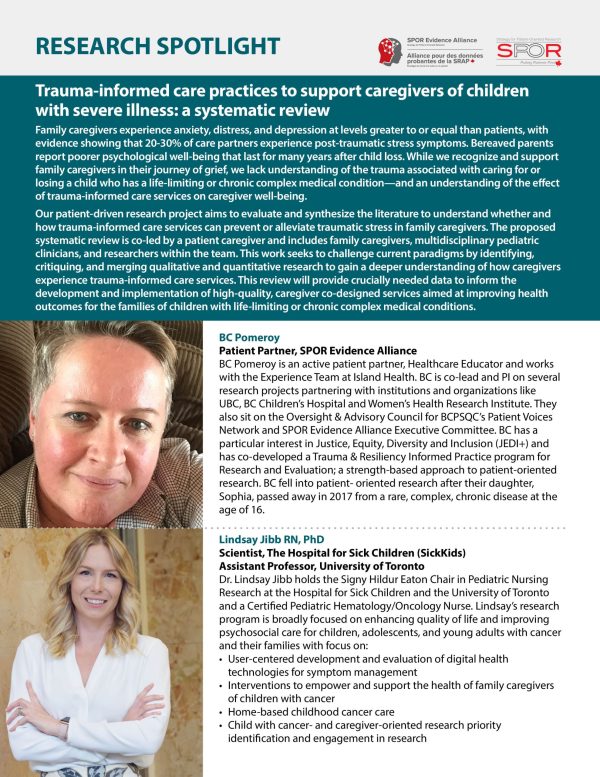Trauma-Informed Care Practices to Support Caregivers
Trauma-informed Care Practices to Support Caregivers of Children with Severe Illness: A Systematic Review
Project Status:In progress
Knowledge User(s)
Patient and Public Partner
Patient/Public Partner(s)
Carmen Carriere
Project Trainee(s)
Alicia Kilfoy
Collaborator(s)
Aimee Hildenbrand, Esther Lee
Funding Source(s)
- Canadian Institutes of Health Research (CIHR) through the Strategy for Patient-Oriented Research (SPOR) Evidence Alliance
Project Objectives
To synthesize the literature on the effect of trauma-informed care services for the prevention and management of traumatic stress and related symptoms in the family caregivers of children with life-limiting illness.
Research Approach
Systematic Review
Project Lead(s)
BC Pomeroy
BC Pomeroy is a Queer Researcher, an Award-Winning Patient Public Engagement Specialist, and an uninvited settler-person on the shared, traditional, ancestral, and unceded territories of the Snuneymuxw (snuh-nay-moe) territory also known as Gabriola Island, British Columbia. BC has a particular interest in Justice, Equity, Diversity, and Inclusion (JEDI+) and has co-developed a Trauma & Resiliency Informed Practice program for Research and Evaluation; a strength-based approach to Patient-Oriented Research. They sit on the board of Health Quality BC Oversight & Advisory Council, Strategy for Patient-Oriented Research Evidence Alliance (SPOR EA), and Canadian Association for Health Services and Policy (CAHSPR).
BC Pomeroy
Patient Partner, BC SUPPORT Unit
BC Pomeroy is a Queer Researcher, an Award-Winning Patient Public...
Lindsay Jibb
Dr. Lindsay Jibb holds the Signy Hildur Eaton Chair in Pediatric Nursing Research at the Hospital for Sick Children and the University of Toronto and is a Certified Pediatric Hematology/Oncology Nurse. Lindsay’s research program is broadly focused on enhancing quality of life and improving psychosocial care for children, adolescents, and young adults with cancer and their families with focus on: user-centered development and evaluation of digital health technologies for symptom management; interventions to empower and support the health of family caregivers of children with cancer; and child with cancer- and caregiver-oriented research priority identification and engagement in research.
Lindsay Jibb
Scientist, The Hospital for Sick Children
Dr. Lindsay Jibb holds the Signy Hildur Eaton Chair in...


